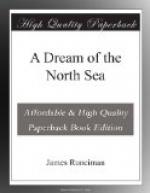Mr. Cassall was a man of peculiarly modern type. From his youth upward he had never once acknowledged himself beaten, though he had known desperate circumstances; he saw that, as our civilization goes, money is accounted a rough gauge of merit, and a man’s industry, tenacity, sobriety, self-control, and even virtue, are estimated and popularly assessed according to the amount of money which he owns, and he resolved that, let who will fail, he at least would have money and plenty of it. He bent his mind on one end for forty years; he was unscrupulous in all respects so long as he could keep within the law; he established a monopoly in his business on the ruins of scores of small firms which he crushed by weight of metal; he had no pity, no consideration, no remorse, in business hours; and he succeeded just as any other man of ability will succeed if he gives himself up body and soul to money-making. He never was proud; he was only hard. To his niece, whom he passionately loved, he would say, “Never be ashamed, my dear, to tell people that your uncle was a wholesale draper and hosier. Your mother was a little ashamed of it, and I had some trouble to cure her. Don’t you be so silly. People think all the more of you for owning frankly that you or your relations have risen from the ranks, as they call it.”
When he retired his wealth was colossal. Smart men would say that Bob Cassall’s name was good for a million anywhere; and indeed it was good for two millions, and more even than that. He never felt the burden of great riches; as soon as he was safe he seemed to change his nature, and became the most dexterously benevolent of men. He abhorred a cadger; he abhorred the very sight of the begging circulars which so appreciably increase the postman’s daily burden. He was a sensible reader, and, when he heard of a traveller who was something more than a mere lion, he would make his acquaintance in the most respectful and unobtrusive way, and he managed to learn much. His shrewd innocence and piquant wit pleased those whom he questioned, and as he was always willing to place his house, horses, boats, and game, at the disposal of any traveller who pleased him, he was reckoned rather a desirable acquaintance. His prejudice against missions to the lower tribes was derived solely from men who had lived and worked among the negroes, and, like all his other prejudices, it was violently strong. He would say, “Have we not good white men here who are capable of anything? I don’t want to assist your Polish Jew in the East, nor Quashee Nigger in Africa. Show me a plucky fellow that is ready to work at anything for any hours, and I’ll help him. But instead of aiding our own kindly white race, you fool away millions on semi-baboons; you send out men at L300 a year and ask them to play at being St. Paul, and you don’t convert a hundred niggers a year—and those who are converted are often very shady customers. Your Indian men drive about in buggies, and the ’cute natives laugh at them. Do you know what a Bengali Baboo or a Pathan is really like? The one is three times as clever as your missionary; the other is a manly fanatic and won’t have him at any price. You’re a maritime nation, and you’ve got ten thousand good British seamen out of work. Why not assist them?”




